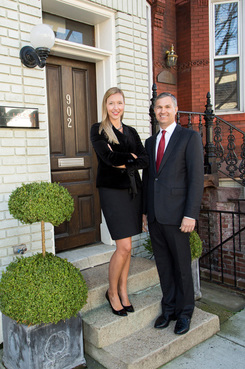'Brilliant and Lucky' Clare Locke Makes Headlines by Keeping Clients Out of Them
Criticized as silencers of the press, Libby Locke and Tom Clare say their work is an antidote to sloppy reporting and the power of "salacious" accusations.
November 28, 2018 at 12:49 PM
6 minute read
The original version of this story was published on National Law Journal
 Libby Locke and Tom Clare of Clare Locke, Washington D.C. (Courtesy photo)
Libby Locke and Tom Clare of Clare Locke, Washington D.C. (Courtesy photo)
Safeguarding the reputation of prominent clients has long been a ticket to success in the legal profession, especially in scandal-plagued Washington, D.C.
It's a skill that's in high demand these days, amid cascading allegations against powerful media and government figures and competing claims about who's peddling so-called Fake News—all supercharged by the #MeToo movement and the polarized politics of the Trump era.
In other words, it's the perfect environment for Tom Clare and Libby Locke.
The Washington-area husband-and-wife team seems to be everywhere these days, noted (and sometimes reviled) for their work on behalf of the unloved and accused. Their Alexandria, Virginia, defamation and commercial litigation boutique, Clare Locke, hasn't shied away from the black hat trope put forward by critics who have labeled them “media assassins.” Instead, their website flaunts their success at having “killed” stories at prominent publications.
Clare and Locke left the partnership at Kirkland & Ellis and opened their boutique steps from the Potomac River in 2014, in a Virginian townhouse with ample roaming room for their dog, Gipper. The pet is named for either Notre Dame football coach Knute Rockne or former President Ronald Reagan, depending on whether you believe Clare, a Fighting Irish alumnus, or Locke, whose favorite president is Reagan.
The duo bristles at the notion that they are hired guns paid to silence the press. They say the plaintiffs-side defamation work they do involves three components—pre-publication counseling, post-publication retraction, and defamation litigation.
“They are worthy adversaries, and they are very good at what they do,” said Lee Levine, Ballard Spahr senior counsel and a leading First Amendment attorney defending media clients. “I would describe them as zealous advocates—and I think it's fair to say there isn't an issue in defamation law in which I agree with them.”
New Media Era
Levine, who is defending The New York Times against a lawsuit brought by Clare Locke on behalf of former Alaska Gov. Sarah Palin, said he has known Clare and Locke for several years. He said few lawyers on the East Coast have been able to establish a practice comparable to theirs, which he noted is more commonly found closer to Hollywood.
The decision to break away from Kirkland was inevitable in retrospect. Clare and Locke proffered that positional conflicts, conflicts created by increasing corporatization of media ownership, and the need to offer rate flexibility made leaving Big Law a necessity.
They now lead a team of nine lawyers, including five Kirkland expats and four recruited from other firms and law schools.
“Our firm culture is incredibly important to us, and so we have always grown in size methodically and deliberately in order to assemble the right team,” they said in an email. “We are looking for lawyers who share our mission and our passion for this area of the law. Given those very specialized criteria, we expect to accomplish future growth by targeted recruiting efforts rather than through a combination with another firm.”
Clare Locke's timing was “brilliant and lucky, or some combination of the two,” said Levine, as the burgeoning boutique scored some high profile wins that drew new clients to its door. The pair scored a multimillion-dollar victory against Rolling Stone for University of Virginia associate dean Nicole Eramo regarding false claims made in the 2014 article “A Rape on Campus.”
The amount of work arriving on their doorstep has only soared since, which they attribute to the proliferation of cable television channels and the explosion of social media and online news. They said competitive pressures combined with shrinking media budgets have made institutional checks-and-balances such as fact-checking increasingly scarce.
“The rise in the number of outlets means, not only a rise in the number of platforms where defamation can occur, but also intense competition among these outlets to 'be first' in publishing news,” Clare and Locke said. “The rush to be first leads to more mistakes (whether intentional or not), more salacious headlines and content to attract readership, and thus, more false and damaging articles being published.”
President Donald Trump's outspoken criticism of the media—alongside the conduct of what Clare and Locke call “reckless media outlets” such as Rolling Stone and Gawker (another adversary)—may have emboldened potential victims previously intimidated into staying silent. And more recent legal battles, such as CNN's dispute with the White House access for Jim Acosta, may have given ammunition to plaintiffs-side defamation lawyers such as Clare, who argues that, “journalists do not get a special hall pass to disobey rules of general applicability.”
“The First Amendment is not magical pixie dust that somehow immunizes people from any sort of scrutiny from the way they behave or the like,” Clare said of CNN's dispute on the Lawyer 2 Lawyer podcast.
Clare Locke is litigating against CNN in a different case—on behalf of a pediatric heart surgeon who filed a defamation suit in Florida. CNN has fought to keep its editorial standards secret as part of its defense in the case.
Levine said he thinks the the number of defamation suits brought by well-financed public figures has risen in recent years, as the individuals find such litigation to be a useful tool against the press. He said courts need to “rise to the occasion” and tell plaintiffs that such tactics will not work, and he compared the legal landscape for media to the time “in the early 60s,” before the U.S. Supreme Court's unanimous decision in New York Times v. Sullivan established the actual malice standard.
Clare and Locke aren't sympathetic to the notion that prominent public figures have an unfair advantage when it comes to protecting their reputations. They have represented several clients facing #MeToo-related accusations, including Jeff Fager, the fired executive producer of CBS' “60 Minutes,” and reports have linked them to many more, including The New York Times' Glenn Thrush; Kimberly Guilfoyle, formerly of Fox News; and fired NBC anchor Matt Lauer.
In representing such clients, Clare Locke has argued that the playing field has tilted substantially toward the accusers, and Locke has pointed to the controversy surrounding Justice Brett Kavanaugh's confirmation fight as evidence. The effect of sexual misconduct allegations against Kavanaugh contradicted the “Victorian notion” that women are powerless compared to men, Locke argued in The Wall Street Journal in September.
“The circus this process has become demonstrates not only the power of #MeToo, but also its potential as a weapon—and how an audience eager for victim narratives and sinister power dynamics can be galvanized without proof to shatter a man's reputation built over a lifetime of hard work,” Locke wrote of the confirmation fight.
Since Kavanaugh joined the nation's highest court, clients have only continued to line up for the firm. In subsequent weeks, Major League Baseball and Breitbart, a Trump-supporting media outlet, have reportedly retained Clare Locke. And given the state of politics and media, there's no sign of a slowdown anytime soon.
This content has been archived. It is available through our partners, LexisNexis® and Bloomberg Law.
To view this content, please continue to their sites.
Not a Lexis Subscriber?
Subscribe Now
Not a Bloomberg Law Subscriber?
Subscribe Now
NOT FOR REPRINT
© 2025 ALM Global, LLC, All Rights Reserved. Request academic re-use from www.copyright.com. All other uses, submit a request to [email protected]. For more information visit Asset & Logo Licensing.
You Might Like
View All
Are Counsel Ranks Getting 'Squeezed' as Nonequity and Associate Pay Grows?
5 minute read
AI's Place in Big Law Broadens, As Firms Embrace Fresh Uses of the Technology

‘Facebook’s Descent Into Toxic Masculinity’ Prompts Stanford Professor to Drop Meta as Client
6 minute read
Penn State Dickinson Law Dean Named President-Elect of Association of American Law Schools
Trending Stories
- 1Class Action Settlements Totaled $40B+ Three Years in a Row: 'We’re in a New Era'
- 2Automaker Pleads Guilty and Agrees to $1.6 Billion in Payouts
- 3MLB's Texas Rangers Search For a New GC and a Broadcasting Deal
- 4Does the Treasury Hack Underscore a Big Problem for the Private Sector?
- 5Gen AI Legal Tech Startup Eve Raises $47 Million Series A Investment
Who Got The Work
J. Brugh Lower of Gibbons has entered an appearance for industrial equipment supplier Devco Corporation in a pending trademark infringement lawsuit. The suit, accusing the defendant of selling knock-off Graco products, was filed Dec. 18 in New Jersey District Court by Rivkin Radler on behalf of Graco Inc. and Graco Minnesota. The case, assigned to U.S. District Judge Zahid N. Quraishi, is 3:24-cv-11294, Graco Inc. et al v. Devco Corporation.
Who Got The Work
Rebecca Maller-Stein and Kent A. Yalowitz of Arnold & Porter Kaye Scholer have entered their appearances for Hanaco Venture Capital and its executives, Lior Prosor and David Frankel, in a pending securities lawsuit. The action, filed on Dec. 24 in New York Southern District Court by Zell, Aron & Co. on behalf of Goldeneye Advisors, accuses the defendants of negligently and fraudulently managing the plaintiff's $1 million investment. The case, assigned to U.S. District Judge Vernon S. Broderick, is 1:24-cv-09918, Goldeneye Advisors, LLC v. Hanaco Venture Capital, Ltd. et al.
Who Got The Work
Attorneys from A&O Shearman has stepped in as defense counsel for Toronto-Dominion Bank and other defendants in a pending securities class action. The suit, filed Dec. 11 in New York Southern District Court by Bleichmar Fonti & Auld, accuses the defendants of concealing the bank's 'pervasive' deficiencies in regards to its compliance with the Bank Secrecy Act and the quality of its anti-money laundering controls. The case, assigned to U.S. District Judge Arun Subramanian, is 1:24-cv-09445, Gonzalez v. The Toronto-Dominion Bank et al.
Who Got The Work
Crown Castle International, a Pennsylvania company providing shared communications infrastructure, has turned to Luke D. Wolf of Gordon Rees Scully Mansukhani to fend off a pending breach-of-contract lawsuit. The court action, filed Nov. 25 in Michigan Eastern District Court by Hooper Hathaway PC on behalf of The Town Residences LLC, accuses Crown Castle of failing to transfer approximately $30,000 in utility payments from T-Mobile in breach of a roof-top lease and assignment agreement. The case, assigned to U.S. District Judge Susan K. Declercq, is 2:24-cv-13131, The Town Residences LLC v. T-Mobile US, Inc. et al.
Who Got The Work
Wilfred P. Coronato and Daniel M. Schwartz of McCarter & English have stepped in as defense counsel to Electrolux Home Products Inc. in a pending product liability lawsuit. The court action, filed Nov. 26 in New York Eastern District Court by Poulos Lopiccolo PC and Nagel Rice LLP on behalf of David Stern, alleges that the defendant's refrigerators’ drawers and shelving repeatedly break and fall apart within months after purchase. The case, assigned to U.S. District Judge Joan M. Azrack, is 2:24-cv-08204, Stern v. Electrolux Home Products, Inc.
Featured Firms
Law Offices of Gary Martin Hays & Associates, P.C.
(470) 294-1674
Law Offices of Mark E. Salomone
(857) 444-6468
Smith & Hassler
(713) 739-1250








